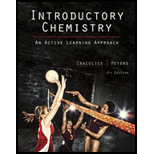
Introductory Chemistry: An Active Learning Approach
6th Edition
ISBN: 9781305079250
Author: Mark S. Cracolice, Ed Peters
Publisher: Cengage Learning
expand_more
expand_more
format_list_bulleted
Question
Chapter 13, Problem 51E
Interpretation Introduction
Interpretation:
The molecules which are tetrahedral in shape are to be identified.
Concept Introduction:
The molecular shape will be tetrahedral when the molecule contains four bonded electron pair at the central atom. In tetrahedral molecules, the central atom is directly attached to four atoms.
Expert Solution & Answer
Trending nowThis is a popular solution!

Students have asked these similar questions
Please help me with identifying these.
Can I please get help with this?
Can I please get help with identifying these?
Chapter 13 Solutions
Introductory Chemistry: An Active Learning Approach
Ch. 13 - Draw the Lewis diagrams for each of the following...Ch. 13 - Prob. 2ECh. 13 - Prob. 3ECh. 13 - Prob. 4ECh. 13 - Draw the Lewis diagrams for each of the following...Ch. 13 - Prob. 6ECh. 13 - Draw the Lewis diagrams for each of the following...Ch. 13 - Prob. 8ECh. 13 - Prob. 9ECh. 13 - Prob. 10E
Ch. 13 - Prob. 11ECh. 13 - Prob. 12ECh. 13 - Prob. 13ECh. 13 - Prob. 14ECh. 13 - Prob. 15ECh. 13 - Prob. 16ECh. 13 - Prob. 17ECh. 13 - Prob. 18ECh. 13 - Prob. 19ECh. 13 - Prob. 20ECh. 13 - Prob. 21ECh. 13 - Prob. 22ECh. 13 - Prob. 23ECh. 13 - Prob. 24ECh. 13 - Prob. 25ECh. 13 - Prob. 26ECh. 13 - Prob. 27ECh. 13 - Prob. 28ECh. 13 - Prob. 29ECh. 13 - Prob. 30ECh. 13 - Prob. 31ECh. 13 - Prob. 32ECh. 13 - Prob. 33ECh. 13 - Prob. 34ECh. 13 - Prob. 35ECh. 13 - Prob. 36ECh. 13 - Prob. 37ECh. 13 - Prob. 38ECh. 13 - Prob. 39ECh. 13 - Prob. 40ECh. 13 - Prob. 41ECh. 13 - Prob. 42ECh. 13 - Prob. 43ECh. 13 - Prob. 44ECh. 13 - Is the carbon tetrachloride molecule, CCl4, which...Ch. 13 - Prob. 46ECh. 13 - Describe the shapes and compare the polarities of...Ch. 13 - Prob. 48ECh. 13 - Prob. 49ECh. 13 - Prob. 50ECh. 13 - Prob. 51ECh. 13 - Prob. 52ECh. 13 - Prob. 53ECh. 13 - Prob. 54ECh. 13 - Prob. 55ECh. 13 - Prob. 56ECh. 13 - Prob. 57ECh. 13 - Prob. 58ECh. 13 - Prob. 59ECh. 13 - Prob. 60ECh. 13 - Prob. 61ECh. 13 - Prob. 62ECh. 13 - Prob. 63ECh. 13 - Prob. 64ECh. 13 - Prob. 65ECh. 13 - Prob. 66ECh. 13 - Prob. 67ECh. 13 - Classify each of the following statements as true...Ch. 13 - Prob. 69ECh. 13 - Draw Lewis diagrams for these five acids of...Ch. 13 - Prob. 71ECh. 13 - Prob. 72ECh. 13 - Describe the shapes of C2H6 and C2H4. In doing so,...Ch. 13 - Prob. 74ECh. 13 - Prob. 75ECh. 13 - C4H10O is the formula of diethyl ether. The same...Ch. 13 - Prob. 77ECh. 13 - Prob. 78ECh. 13 - Draw Lewis diagrams for water and dihydrogen...Ch. 13 - Prob. 2PECh. 13 - Prob. 3PECh. 13 - Prob. 4PECh. 13 - Prob. 5PECh. 13 - What is the Lewis diagram of butane, C4H10?Ch. 13 - Prob. 7PECh. 13 - Prob. 8PECh. 13 - Prob. 9PECh. 13 - Prob. 10PECh. 13 - In the gas phase, tin (II) chloride is a...Ch. 13 - Prob. 12PECh. 13 - Determine the molecular geometry around each...Ch. 13 - Describe the molecular geometry around each carbon...Ch. 13 - Is the difluoromethane molecule polar or nonpolar?...Ch. 13 - Prob. 1LDRECh. 13 - Prob. 2LDRECh. 13 - Prob. 3LDRECh. 13 - Prob. 4LDRECh. 13 - Prob. 5LDRECh. 13 - Prob. 6LDRECh. 13 - Prob. 7LDRECh. 13 - Prob. 8LDRECh. 13 - Prob. 9LDRECh. 13 - Prob. 10LDRE
Knowledge Booster
Similar questions
- For the reaction: CO2(g) + H2(g) --> CO (g) + H2O (g) Kc= 0.64 at 900 degrees celcius. if initially you start with 1.00 atmoshpere of carbon dioxide and 1 atmoshpere of hydrogen gas, what are the equilibrium partial pressuses of all species.arrow_forwardCan I please get this answered? With the correct number of significant digits.arrow_forwardDraw the Hofmann product of the dehydroiodination of this alkyl iodide. ☐ : + Explanation Check esc F1 2 3 I 88 % 5 F5 I. X © tBuOK Click and drag to sta drawing a structure. © 2025 McGraw Hill LLC. All Rights Reserved. Te BI BB F6 W E R Y S H Karrow_forward
arrow_back_ios
SEE MORE QUESTIONS
arrow_forward_ios
Recommended textbooks for you
 Introductory Chemistry: An Active Learning Approa...ChemistryISBN:9781305079250Author:Mark S. Cracolice, Ed PetersPublisher:Cengage Learning
Introductory Chemistry: An Active Learning Approa...ChemistryISBN:9781305079250Author:Mark S. Cracolice, Ed PetersPublisher:Cengage Learning Chemistry: The Molecular ScienceChemistryISBN:9781285199047Author:John W. Moore, Conrad L. StanitskiPublisher:Cengage Learning
Chemistry: The Molecular ScienceChemistryISBN:9781285199047Author:John W. Moore, Conrad L. StanitskiPublisher:Cengage Learning

Introductory Chemistry: An Active Learning Approa...
Chemistry
ISBN:9781305079250
Author:Mark S. Cracolice, Ed Peters
Publisher:Cengage Learning

Chemistry: The Molecular Science
Chemistry
ISBN:9781285199047
Author:John W. Moore, Conrad L. Stanitski
Publisher:Cengage Learning